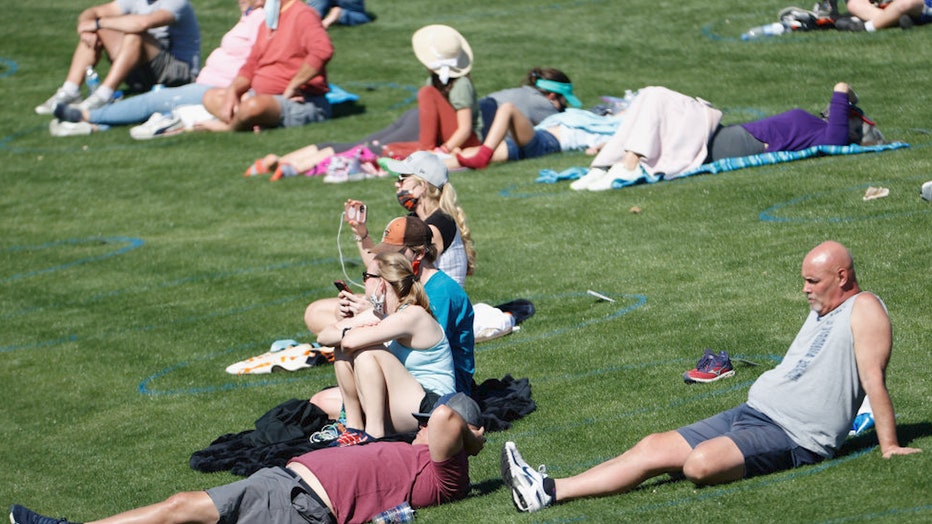‘Now is not the time to relax’: CDC director warns of possible 4th surge amid easing of COVID-19 restrictions
A fourth surge of COVID-19 cases is possible if the United States starts to relax health restrictions prematurely, the director of the U.S. Centers for Disease Control and Prevention warned this week.
In a Monday morning press briefing, Dr. Rochelle Walensky, director of the CDC, stated that while the average number of daily cases is lower than what the United States saw in the past few months, the levels the country is at currently are still too high.
"I remain deeply concerned about a potential shift in the trajectory of the pandemic. The latest CDC data continue to suggest that recent declines in cases have leveled off at a very high number. The most recent seven-day average of cases — approximately 67,200 — represents an increase of a little over 2% compared to the prior seven days," Walensky said.
Deaths have also increased 2% from the previous seven-day average, with 2,000 deaths per day, evidencing that numbers are stalling rather than dropping.
"These data are evidence that our recent declines appear to be stalling — stalling at over 70,000 cases a day. With these new statistics, I am really worried about reports that more states are rolling back the exact public health measure we have recommended to protect people from COVID-19," Walensky said.
"I understand the temptation to do this. 70,000 cases a day seemed good compared to where we were just a few months ago. But we cannot be resigned to 70,000 cases a day, 2,000 daily deaths," Walensky said.
And as several states eased or eliminated their health restrictions and mask mandates, Walensky pleaded with Americans to stay vigilant and to not lose "the hard-earned ground we have gained."

FILE - Socially-distant fans look on during the fifth inning of the MLB spring training game between the Texas Rangers and the San Francisco Giants on March 01, 2021 in Surprise, Arizona.
RELATED: Scientists say COVID-19 could become endemic but pose less of societal threat over time
"Please hear me clearly: At this level of cases, with variants spreading, we stand to completely lose the hard-earned ground we have gained. These variants are a very real threat to our people and our progress. Now is not the time to relax the critical safeguards that we know can stop the spread of COVID-19 in our communities, not when we are so close," she said.
Meanwhile, Texas on Tuesday became the biggest state to lift its mask rule, joining a rapidly growing movement by governors and other leaders across the U.S. to loosen COVID-19 restrictions despite pleas from health officials not to let their guard down yet.
The Lone Star State will also do away with limits on the number of diners who can be served indoors, said Republican Gov. Greg Abbott, who made the announcement at a restaurant in Lubbock.
The governors of Michigan, Mississippi and Louisiana likewise eased up on closures of bars, restaurants and other businesses Tuesday, as did the mayor of San Francisco.
"Removing statewide mandates does not end personal responsibility," said Abbott, speaking from a crowded dining room where many of those surrounding him were not wearing masks. "It’s just that now state mandates are no longer needed."
An Indianapolis-area bar was filled with maskless patrons over the weekend. In Southern California, people waited in lines that snaked through a parking lot on a recent weekday afternoon for the chance to shop and eat at Downtown Disney, part of Disneyland. (The theme park's rides remain closed.) And Florida is getting ready to welcome students on spring break.
"People want to stay safe, but at the same time, the fatigue has hit," said Ryan Luke, who is organizing a weekend rally in Eagle, Idaho, to encourage people to patronize businesses that don’t require masks. "We just want to live a quasi-normal life."
The novel coronavirus is responsible for killing more than half a million Americans. The U.S. death toll accounts for a substantial portion of the global toll of 2.5 million people.
"We have the ability to stop a potential fourth surge of cases in this country. Please stay strong in your conviction. Continue wearing your well-fitted mask and taking the other public health prevention actions that we know work. Ultimately, vaccination is what will bring us out of this pandemic. To get there, we need to vaccinate many more people," Walensky said.
The Associated Press contributed to this report.


